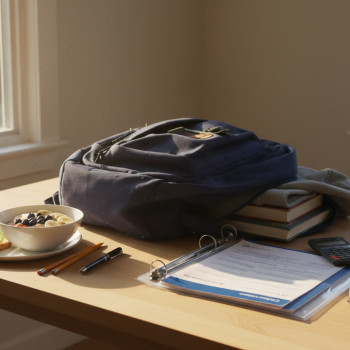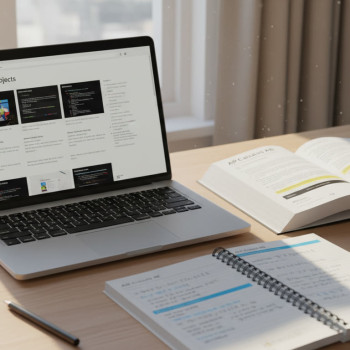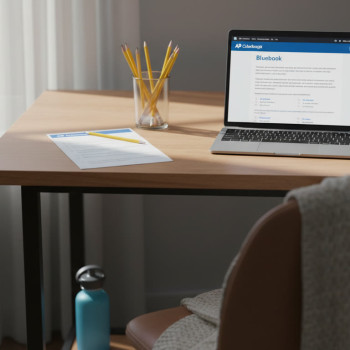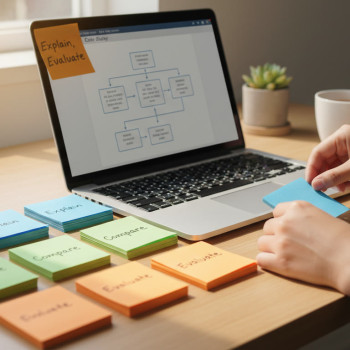The dilemma: Sandals, suitcases, and AP exams
Summer road trips, family reunions, and school breaks are irresistible. But when you’re preparing for AP exams, travel season can feel like a stressful cliffhanger — especially when Wi‑Fi is spotty, outlets are scarce, and your usual online study routine evaporates. This post is a friendly, practical blueprint for thriving academically while you travel. It’s written for students who want a calm, realistic approach: focused, portable, and built for low connectivity. Think of it as the travel-friendly version of your study life — organized, resilient, and actually enjoyable.

Why low-connectivity planning matters
We often assume we’ll have perfect internet access. In reality, travel throws curveballs: airplane mode, airline Wi‑Fi blocks for streaming, remote cabins with satellite connection, or international plans that make tethering cost-prohibitive. Relying solely on streaming videos or cloud docs can leave you stranded. A low-connectivity plan frees you from that dependence. You keep momentum, reduce stress, and avoid the last-minute scramble that turns a scenic vacation into a cram session you’ll regret.
Mindset first: Travel is not an exam sabbatical
It helps to frame travel as an intentional pause rather than a break in progress. Small, consistent wins during travel (30–60 minutes a day of focused practice) compound. You don’t need to replicate your entire school-week study blocks. Instead, aim for steady micro‑routines that keep concepts warm and build stamina.
Pack a travel study kit: compact and connection-proof
Your study kit should be physically small, self-sufficient, and tailored to your AP subject(s). Here’s a checklist of essentials that fit in a backpack or carry-on pocket:
- One subject-focused paperback review book or condensed course notes (lightweight and old-school reliable).
- Printed practice problems and one or two past free-response questions (FRQs) per subject.
- Index cards or a small notecard app exported to PDFs for offline viewing.
- A compact planner or digital note with your daily mini-goals saved offline.
- Portable charger and charging cables; earbud headphones for audio review.
- Physical timer or a phone timer set before you lose signal.
Why paper still wins on the road
Paper doesn’t need updates, battery, or permission slips. For many students, physically writing helps memory retention: sketching diagrams, annotating passages, or solving problems by hand strengthens recall. A 20–30 minute handwriting session on FRQs or math problems can be worth more than an hour of passive video watching when you’re traveling.
Designing your low-connectivity routine
A routine for travel should be flexible, short, and focused on high-impact actions. Use the following framework as a template and tweak it based on your exam date and subject:
Daily travel micro-routine (30–60 minutes)
- 10 minutes: Warm-up — review 10–15 flashcards or skim a one-page formula sheet.
- 20–30 minutes: Active practice — one FRQ, one practice problem set, or one close-reading passage.
- 5–10 minutes: Reflection — jot down one thing you learned, one mistake to fix, and the goal for tomorrow.
Weekly deep session (60–120 minutes, schedule it into travel plans)
Plan for one longer session per week while you have a reliable socket or a quiet spot: timed practice test sections, a full FRQ, or a longer problem set. This helps maintain testing stamina and keeps you calibrated to the timing pressures of the real exam.
Subject-specific tips for low-connectivity studying
Not all AP subjects demand the same approach. Here are subject-tailored strategies you can use while offline.
AP Calculus (AB/BC)
- Pack formula sheets and a small set of worked problems for limits, derivatives, integrals, and series (for BC).
- Practice free-response by hand — show every step and time yourself with a simple kitchen timer.
- Use index cards for trig identities and common integrals to keep your recall sharp.
AP English Language & Composition / English Literature
- Bring annotated passages or short poems to practice rhetorical analysis and close reading.
- Practice writing a compact thesis and a 20–30 minute timed essay using your printed practice prompts.
- Keep a small vocabulary card deck of high-utility words and rhetorical terms.
AP History (US, World, European)
- Create concise timelines on index cards for key eras and causes; practice writing thesis-driven statements that connect evidence to claims.
- Use evidence cards — each with a fact, date, and why it matters — to practice building DBQ or LEQ paragraphs.
- Simulate sourcing and contextualization questions with short notes and time limits.
AP Sciences (Biology, Chemistry, Environmental Science)
- Sketch diagrams, cycles, or molecular structures from memory; then check against your book when you reconnect.
- Carry a notebook of key lab techniques and typical data patterns (e.g., titration curves, energy diagrams).
- Practice short calculations and graph interpretation problems with a basic calculator.
Offline assessment: what to bring and how to simulate exam conditions
Simulating test conditions on the road is one of the best ways to keep your performance calibrated. Even if you can’t run a full exam offline, you can still mimic sections and pacing.
| What to Simulate | How to Do It Offline | Why It Helps |
|---|---|---|
| Timed Multiple Choice | Use printed question sets; time yourself with a watch or phone timer. | Maintains pacing and decision-making under time pressure. |
| Free‑Response (FRQ) | Print past FRQs; write by hand and strictly follow time limits. | Improves structure, clarity, and time allocation per part. |
| Reading/Close Analysis | Mark up printed passages and write short paragraph responses. | Builds evidence-based reading and annotation speed. |
| Stamina Run | Block out 90 minutes in a quiet place to complete a mix of problems. | Preserves concentration and mental endurance for exam day. |
Connectivity strategies: when you do have a signal
Strive for asynchronous, targeted online sessions. Don’t binge everything the moment you get Wi‑Fi — be intentional:
- Schedule a 30–60 minute check-in to sync study progress: download any necessary resources, check one or two video lessons, and upload handwritten answers if you want feedback later.
- Use that window to submit a question to a tutor, request feedback, or watch a single AP Daily video — not to scroll social media.
- If you use syncing apps for notes, do a deliberate sync and then switch to airplane mode to preserve battery and focus.
Pro tip: Bundle your online tasks
Create a short checklist of things to do when online — download a batch of PDFs, send one email to your teacher or tutor, and queue a video or two for offline viewing. Treat connectivity like a resource: you wouldn’t spend a gas tank on one stoplight, so don’t disperse your online tasks across tiny windows.
Study schedule sample for a 7‑day travel week
This sample assumes limited internet and peaks with one longer session on a restful afternoon.
- Day 1: Orientation — pack materials, create a 7-day checklist, and do a 30-minute diagnostic to assess weak spots.
- Day 2: Micro-practice (30 minutes) — timed MC set; reflect on one common mistake.
- Day 3: Deep reading (45 minutes) — FRQ practice or a timed essay.
- Day 4: Travel day — light review (15–20 minutes) of flashcards and formulas between legs.
- Day 5: Weekly deep session (90 minutes) — simulate an exam section or full-length passage set.
- Day 6: Review and repair (45 minutes) — review errors from Day 5 and rewrite one FRQ paragraph.
- Day 7: Restorative review (30 minutes) — easy review, reflect, and set goals for the return week.
When to use tutoring — and how Sparkl’s personalized tutoring fits
Travel can create gaps in instruction or feedback. That’s where targeted tutoring shines: a short 1‑on‑1 session can refocus your strategy, clarify a muddy concept, and give you corrective action that’s compact and impactful. If you book a tutor for a 30–45 minute session, you can get test-like feedback on a single FRQ or an evening session that realigns your study plan for the rest of the trip.
Personalized tutoring — such as Sparkl’s 1-on-1 guidance and tailored study plans — works well in travel mode because it’s focused and adaptive. Tutors can assign a short, offline-friendly practice set to complete while you’re disconnected, then review it during a scheduled check-in. They can also use AI-driven insights to target your weakest skills and craft bite-sized assignments that fit into travel windows without overwhelming you.
Keeping your mental game strong on the road
Travel introduces unpredictability, which can raise stress. A strong mental routine reduces anxiety and keeps your learning efficient.
Short mental-check rituals
- Breathe: Two minutes of deep breathing before each study block improves focus and reduces travel tension.
- Micro-wins: Start each session with one achievable goal (e.g., “I’ll correctly solve two FRQ parts”).
- Gratitude anchor: Note one thing you enjoyed during travel each day to keep burnout at bay.
Sleep, movement, and boundaries
Don’t sacrifice sleep for extra study; the trade-off is rarely worth it. If you’re juggling time zones, keep a consistent sleep window and protect it. Short walks, stretching, or 10‑minute movement breaks between sessions reset your cognitive bandwidth and maintain energy for both travel and study.
Common travel pitfalls and how to avoid them
- Overpacking materials: Choose two high-impact resources rather than bringing your entire library.
- Chasing perfection: If you miss a day, don’t panic. Use catch-up micro-sessions rather than marathon cramming.
- Expecting perfect study conditions: Build flexible routines that accept noise, interruptions, and cramped spaces.
- Sporadic online bursts: Resist trying to binge all digital content in one go; it’s inefficient and overwhelming.
How to measure progress while offline
Progress feels fuzzy when you can’t check online dashboards. Use these offline metrics to measure real gains:
- Accuracy improvement: Track percent correct on printed practice sets over the trip.
- Speed gains: Time your MC sections and note reductions in time per question.
- Quality of writing: Rate your FRQ responses against a simple rubric (thesis, evidence, reasoning, clarity).
- Confidence scale: Each day, record your confidence 1–5 on key topics — trends matter more than isolated numbers.
Returning home: transition plan to reconnect and scale up
When you’re back with reliable connectivity, don’t dive into a new study binge. Use a transition plan:
- Day 1 back: Sync and upload handwritten practice, spend 30 minutes reviewing feedback, and schedule any tutoring sessions for targeted corrections.
- Days 2–4: Re-establish full study blocks, but only at 70% of your pre-travel intensity to rebuild endurance gradually.
- End of week: Take a full-length timed section to assess where you are and update your study calendar.
Examples: Two real-world travel scenarios and routines
Scenario A — A week-long family vacation with long drives
Plan: Use drives for passive review (audio notes, listening to recorded explanations or reading aloud), concentrate morning and evening on focused sessions, and schedule one quiet afternoon for a weekly deep session.
- Morning (30 min): Flashcards and formulas.
- Afternoon (quiet moment, 60–90 min): Timed FRQ or mixed problems.
- Evening (20 min): Reflection and light review.
Scenario B — A short international trip with limited data
Plan: Prepare by downloading or printing resources beforehand. Reserve the best offline practice for the first and last travel days and use mid-trip pockets of study to maintain recall.
- Pre-departure: Print 5–7 practice prompts and a formula sheet; download any key videos.
- In-transit: 15–20 minute review bursts during layovers.
- Return day: Full 90-minute simulation to rebuild momentum.
Checklist to leave home confident
- Pack printed practice: past FRQs and a short multiple-choice booklet.
- Download or print your syllabus, one-page formula sheets, and a condensed review book.
- Set times for 2–3 micro sessions per travel day and one scheduled longer session midweek.
- Book at least one short tutoring check-in (30–45 minutes) during or immediately after travel to review mistakes.
- Bring a portable charger and noise-cancelling headphones.
Final notes: Balance, intention, and calm
Travel doesn’t have to be a study sabbatical. With small, intentional routines and the right kit, you can protect your AP readiness while enjoying the trip. Keep your expectations realistic: steady progress beats erratic bursts. When you need personalized feedback, a short 1‑on‑1 session with a specialist — for example, Sparkl’s personalized tutoring with tailored study plans and expert tutors — can be the perfect complement to your offline work. It’s not about perfect control; it’s about smart choices that let you study well and live your travel moments fully.

Safe travels and steady studying — you can keep your AP momentum moving forward, even with limited connection. Pack light, practice smart, and let your trip recharge you as well as your phone.

















No Comments
Leave a comment Cancel